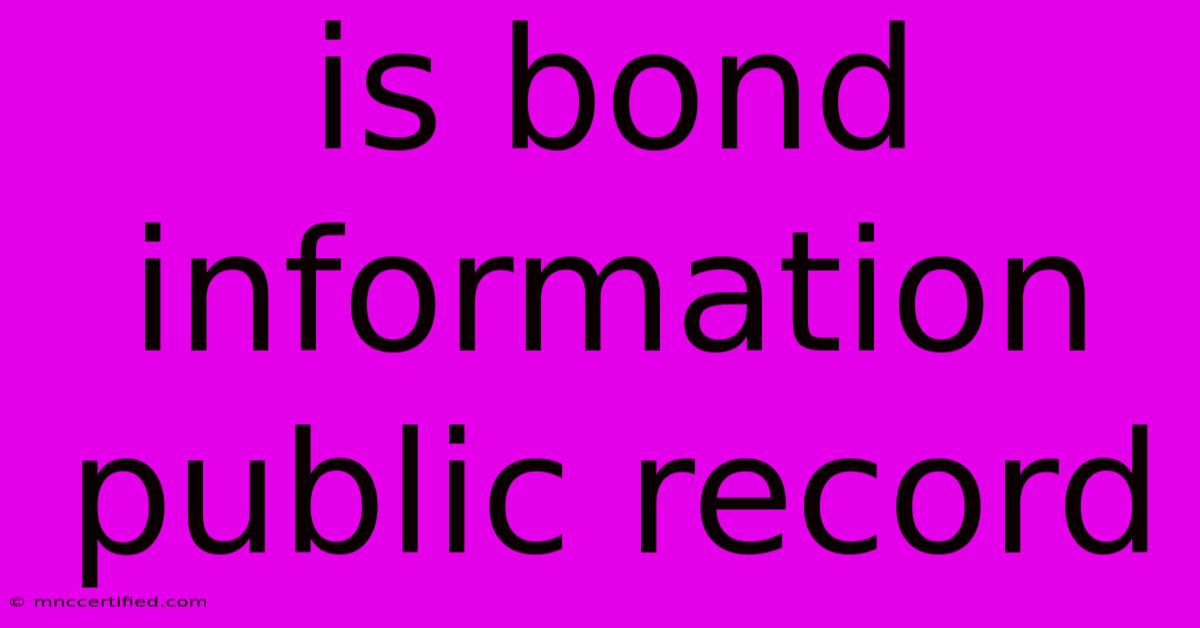Is Bond Information Public Record

Table of Contents
Is Bond Information Public Record? A Comprehensive Guide
The question of whether bond information is public record is complex, varying significantly depending on the type of bond, the jurisdiction, and the specific information sought. This comprehensive guide will delve into the nuances of bond information accessibility, helping you understand what information is typically public and how to access it.
What Types of Bonds Exist?
Before exploring public accessibility, it's crucial to understand the different types of bonds. The answer to whether information is public greatly depends on this categorization:
-
Surety Bonds: These bonds guarantee the performance of a contractual obligation. Common examples include contractor bonds, court bonds (bail bonds), and fiduciary bonds. Information related to these bonds often has varying levels of public accessibility. Bail bonds, for instance, are usually part of the public court record. However, the specifics might be limited to the bond amount and the surety company involved. Detailed financial information about the individual posting the bond may be protected.
-
Municipal Bonds: Issued by state and local governments to finance public projects like schools and infrastructure, information regarding these bonds is generally considered public record. This includes details such as the bond's purpose, interest rate, maturity date, and the issuer's financial information. However, some internal documents or deliberations leading up to the issuance may be protected.
-
Corporate Bonds: These are debt securities issued by corporations to raise capital. While the basic details of a publicly traded corporate bond (like the coupon rate and maturity date) are publicly available through financial databases and regulatory filings (like the SEC's EDGAR database), more sensitive internal information regarding the company's financial health that might inform investment decisions isn't necessarily considered public record.
-
Treasury Bonds (Government Bonds): Issued by national governments, information regarding these bonds is generally considered public, although the specifics available may vary by country. Typically, information about the issuance, interest rates, and outstanding amounts are readily accessible.
What Bond Information is Typically Public?
The level of public access varies greatly, but generally speaking, the following information is often considered public record, depending on the type of bond and jurisdiction:
- Bond Amount: The total value of the bond is typically a matter of public record.
- Issuing Entity: The name of the entity (individual, company, or government) that issued the bond is usually public knowledge.
- Surety Company (for Surety Bonds): The name of the surety company providing the guarantee is typically public information.
- Bond Number/Identifier: A unique identifier for the bond.
- Maturity Date (for some bonds): The date the bond expires or is repaid.
- Interest Rate (for some bonds): The interest rate paid on the bond.
Accessing Public Bond Information
Accessing public bond information requires understanding the specific jurisdiction and the type of bond. Here are some potential avenues:
- Court Records: For court bonds (bail bonds), information is usually available through the court clerk's office in the relevant jurisdiction.
- Municipal Government Websites: For municipal bonds, information may be found on the website of the issuing municipality or its finance department.
- SEC EDGAR Database: For information on corporate bonds, the Securities and Exchange Commission's EDGAR database can be a valuable resource.
- Financial News Websites and Databases: Major financial news sources and databases often provide information on various bond types.
- Freedom of Information Act (FOIA) Requests (USA): In the US, FOIA requests can be used to obtain information from government agencies.
Important Considerations
Remember, state and local laws vary significantly. What's considered public record in one jurisdiction may be protected in another. Furthermore, accessing sensitive financial information may require legal processes or adherence to specific privacy regulations. Always consult with a legal professional if you have specific concerns about accessing bond information or navigating legal requirements.
This guide provides a general overview. Always conduct thorough research based on your specific needs and jurisdiction before attempting to access bond information. The accessibility of bond information is a multifaceted issue requiring careful consideration of various legal and regulatory frameworks.

Thank you for visiting our website wich cover about Is Bond Information Public Record. We hope the information provided has been useful to you. Feel free to contact us if you have any questions or need further assistance. See you next time and dont miss to bookmark.
Featured Posts
-
Civil Court Mc Gregor Rape Case Ends
Nov 23, 2024
-
Euro Millions 100 Millionaires Friday
Nov 23, 2024
-
Ticket Debacle Coldplay Fans Miss Out
Nov 23, 2024
-
Budget Hornets Player Earns High Praise
Nov 23, 2024
-
Marescas Ucl Bid Chelsea Showdown
Nov 23, 2024